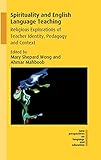Spirituality and English Language Teaching : Religious Explorations of Teacher Identity, Pedagogy and Context / ed. by Mary Shepard Wong, Ahmar Mahboob.
Material type: TextSeries: New Perspectives on Language and EducationPublisher: Bristol ; Blue Ridge Summit : Multilingual Matters, [2018]Copyright date: ©2018Description: 1 online resourceContent type:
TextSeries: New Perspectives on Language and EducationPublisher: Bristol ; Blue Ridge Summit : Multilingual Matters, [2018]Copyright date: ©2018Description: 1 online resourceContent type: - 9781788921534
- 9781788921541
- English language -- Religious aspects
- English language -- Study and teaching -- Foreign speakers
- English teachers -- Religious life
- FOREIGN LANGUAGE STUDY / English as a Second Language
- EFL ethics
- Faith in the classroom
- Language teacher identity
- Pedagogical ethics
- Religion
- Religion in the classroom
- Religion in the language classroom
- Spirituality and ELT
- Spirituality
- TESOL ethics
- 428.0071 23
- PE1128.A2 S635 2018
- online - DeGruyter
| Item type | Current library | Call number | URL | Status | Notes | Barcode | |
|---|---|---|---|---|---|---|---|
 eBook
eBook
|
Biblioteca "Angelicum" Pont. Univ. S.Tommaso d'Aquino Nuvola online | online - DeGruyter (Browse shelf(Opens below)) | Online access | Not for loan (Accesso limitato) | Accesso per gli utenti autorizzati / Access for authorized users | (dgr)9781788921541 |
Frontmatter -- Contents -- Contributors -- Acknowledgments -- Foreword: Complexifying our Understanding of Spirituality -- 1. Introduction: Why a Book on Spirituality and Language Teaching? -- Part 1: Religious Faith and Teacher Identity -- 2. The Dangers and Delights of Teacher Spiritual Identity as Pedagogy -- 3. Buddhist Principles and the Development of Leadership Skills in English Language Program Administration and Teaching -- 4. Attempting Interfaith Dialogue in TESOL: A Duoethnography -- 5. Response to Part 1. Possibilities for Nonattachment: Investigating the Affective Dimension of Imposition -- Part 2: Religious Faith and Pedagogical Practice -- 6. A Buddhist in the Classroom Revisited -- 7. The Relevance of Hinduism to English Language Teaching and Learning -- 8. Multiple, Complex and Fluid Religious and Spiritual Influences on English Language Educators -- 9. Response to Part 2. ‘Religious Faith’ and ‘Pedagogical Practice’: Extending the Map. A Response to Brown, Sharma and Vandrick -- Part 3. Religious Faith and the Language Learning Context -- 10. Language and Religion in the Construction of the Lebanese Identity -- 11. Teachers’ Perceptions of the Interface between Religious Values and Language Pedagogy in Egypt -- 12. Church-sponsored English as a Second Language in Western Canada: Grassroots Expressions of Spiritual and Social Practice -- 13. Response to Part 3. Religious Faith and the Language Learning Context: Exploring the ‘Interface’ -- 14. Spirituality and English Language Teaching: Moving Forward -- Afterword: Spirituality in Language Teaching -- Index
restricted access online access with authorization star
http://purl.org/coar/access_right/c_16ec
This collection of 16 reflective accounts and data-driven studies explores the interrelationship of religious identity and English Language Teaching (ELT). The chapters broaden a topic which has traditionally focused on Christianity by including Buddhist, Hindu, Muslim and non-religious perspectives. They address the ways in which faith and ELT intersect in the realms of teacher identity, pedagogy and the context and content of ELT, and explore a diverse range of geographical contexts, making use of a number of different research methodologies. The book will be of particular interest to researchers in TESOL and EFL, as well as teachers and teacher trainers.
Mode of access: Internet via World Wide Web.
In English.
Description based on online resource; title from PDF title page (publisher's Web site, viewed 25. Jun 2024)


